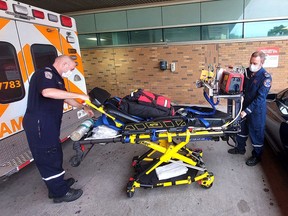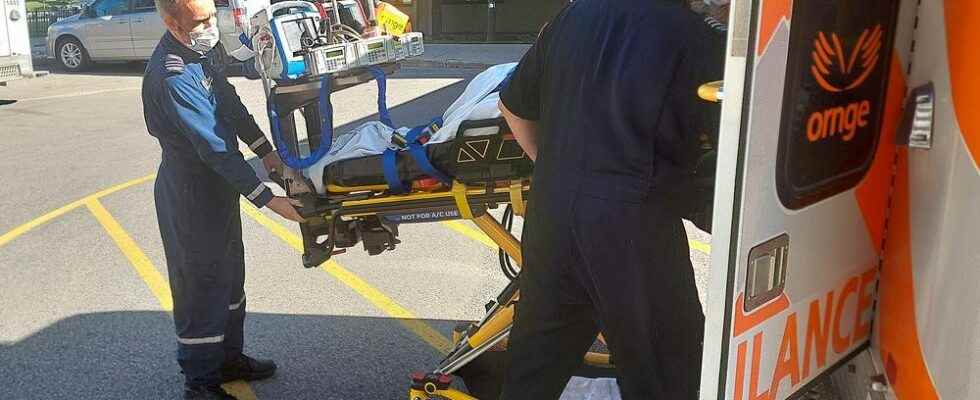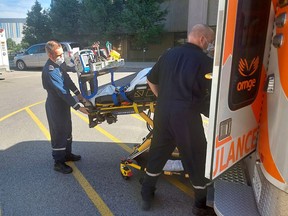
Veteran Ornge paramedics Andrew Whittemore and Matt Laverty are trained to provide patient care while flying in a plane or helicopter, but these days they’ve been operating while on the road, while based in Chatham-Kent.
A temporary Ornge Critical Care Land Ambulance base, first set up in Chatham-Kent on April 13, 2020 during the COVID-19 pandemic, is now officially permanent. This is the first expansion of the program since its inception in 2008, adding to the existing bases in the Greater Toronto area, Ottawa and Peterborough regions.
The Chatham Daily News recently joined Whittemore and Laverty for a ride-along to see them in action.
A few hours into their shift and a call comes in to transfer a patient with a heart condition from Windsor to a higher level of care in London.
They find out where they need to go and while en route to pick up the patient, they receive an e-mail with pertinent details about the patient’s condition.
Whittemore said before they arrive at the hospital, a doctor with Ornge will triage the call to determine the level of care needed.
Depending on the situation, it could include having a patient on ventilator or having to administer pain medication or an anesthetic.
“What we really are is an ICU (intensive care unit) or critical care transport team,” Whittemore said.
The patient with the heart defect was very stable and just needed monitoring, but that’s not always the case.
Whittemore said some patients “are clinging to life. . . they’re critically ill on ventilators and we move those patients by ourselves.”
Keeping people alive can be a big task as the Ornge ambulance rolls down the highway.
“The ones who are really sick it’s a challenge to get them where you need to get them to get the care they need,” Whittemore said.
“The goal is for a smooth transfer off to the next destination,” Laverty said. “Our goal is to be in and out in a half-hour for really complicated patients, but sometimes that’s not doable because there’s just so much going on.”
The Chatham base will be staffed 12-hours a day, seven days a week to enhance Ornge’s ability to provide patient care throughout Southwestern Ontario, including the London-Windsor corridor and Sarnia.
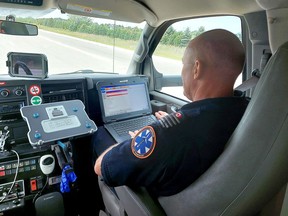
“A permanent base in Chatham-Kent is great news for patients and our hospital partners,” says Wade Durham, chief operating officer – medical operations. “This location has proven to be a necessary resource in the healthcare system during COVID-19 and we look forward to continue collaborating with our hospital and local paramedic service partners.”
He added Ornge thanks the Chatham-Kent EMS, particularly general manager Donald MacLellan, “for collaborating with and hosting Ornge crews for the last two years at their headquarters.”
Having highly trained paramedics with Ornge with the skill and specialized equipment to safely transfer critical patients to a higher level of care means medical staff doesn’t have to be pulled away from often short-staffed emergency rooms.
Before Ornge existed, Whittemore said a hospital would often have to send a doctor, nurse and respiratory therapist with a local ambulance to transfer a critical patient to a larger hospital out of town.
“For several hours, the hospitals lose those people,” he said, adding the EMS is also down an ambulance.
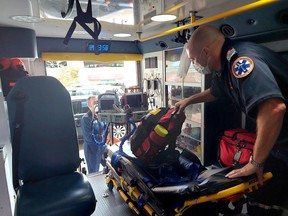
Whittemore said when Ornge first opened its temporary base in Chatham, some smaller area hospitals knew the service exited, but hadn’t seen it.
He said they traveled to smaller hospitals in Chatham, Leamington, Wallaceburg and Newbury to explain their service.
However, this didn’t come as a surprise to Whittemore, who was part of the regional program when it began.
“A lot of hospitals didn’t believe they could send some of these patients that were so sick without sending a nurse or a doctor or a respiratory therapist,” Whittemore said.
He added there were concerns about whether it was safe to do that.
“I think once you do a few calls and they see the care you’re able to provide and do it safely, they love it now.”
Laverty believes the pandemic “really provided an opportunity to showcase the versatility of this service.”
He added it was needed to help transfer patients to free up space in ICU and critical care beds.
“I think at that point, it was easy to demonstrate this is a versatile resource for the area that could be utilized for the regular day-to-day needs of Southern Ontario,” Laverty said.
